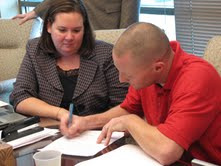Author Archive
Attorney Kip Scott: Disaster Relief and Personal Injury Work quite Similar
February 25th, 2014. By BrendaC
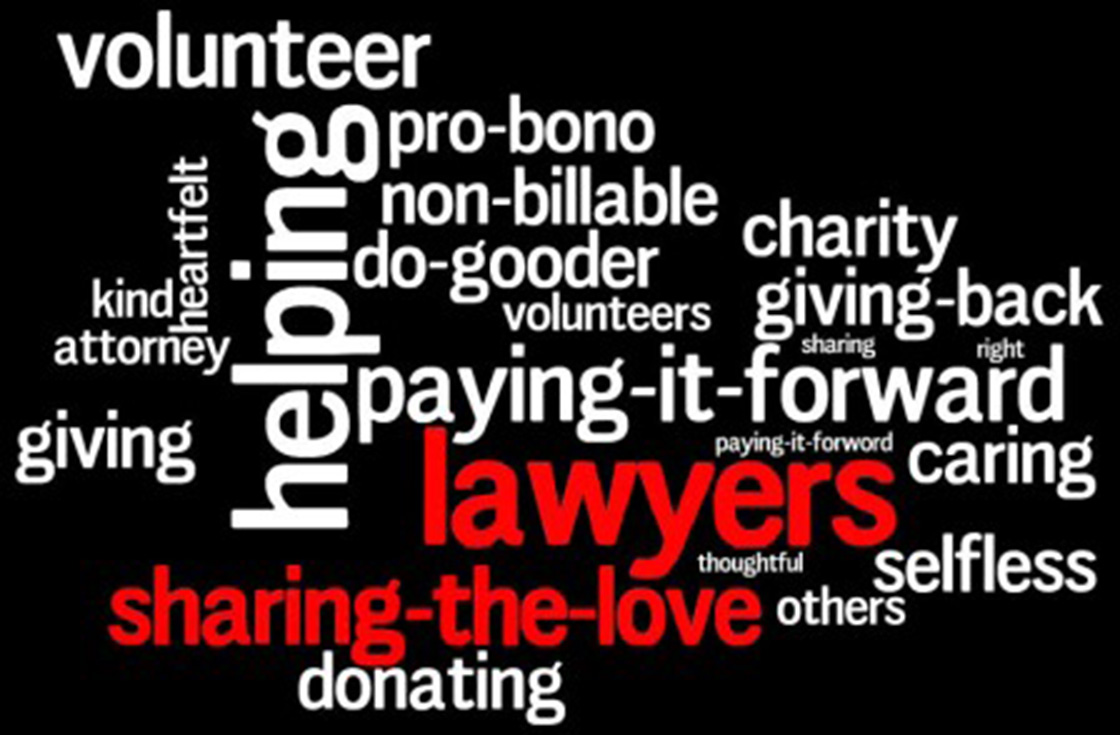 Over the last 15 years, Kip Scott has set aside his law practice on three separate occasions, packed up and gone to work as a disaster relief volunteer. His latest sojourn was to an area around the city of Tacloban in the Philippines where thousands of people were left homeless and in desperate need after Typhoon Haiyan ravaged part of Southeast Asia last November.
Over the last 15 years, Kip Scott has set aside his law practice on three separate occasions, packed up and gone to work as a disaster relief volunteer. His latest sojourn was to an area around the city of Tacloban in the Philippines where thousands of people were left homeless and in desperate need after Typhoon Haiyan ravaged part of Southeast Asia last November.
“Some people ask ‘why don’t you just send the money’?” says Scott. “The answer is you don’t know how much those people appreciate seeing an American face there. It tells them ‘we have not forgotten about you’.”
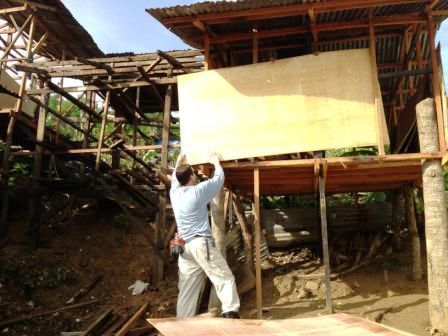
-
“Our team had to drive and take the ferry many hours to Cebu to purchase building materials because there were no materials available near Tacloban”
Scott has trained as a volunteer disaster relief worker with the Salvation Army and had real-life on-the-job experience in New York during 9-11 and in New Orleans after Hurricane Katrina.
“I actually had never been to New York before 9-11,” says Scott who heard the news and within days was on his way to the site of the Twin Towers attack in Manhattan. “I was attached to the New York Medical Examiner’s Office and my job was to be a driver and deliver supplies to different locations around ground zero.”
“It was very difficult,” says Scott. “They considered the area to be an open grave and people were very angry that their friends and family had been murdered basically. Hurricane Katrina and Typhoon Haiyan were natural disasters but there was still a lot of hurt and sorrow and loss.”
Kip Scott specializes in personal injury law. Although the situations are profoundly different, his clients are often being tossed about in a firestorm of devastating personal circumstances. “Many of the people I see in my practice in Irvine, California are going through the worst time in their lives. Many of them can’t work, they have huge medical bills, and they are in emotional pain or physical pain. We try to find them a way out and help them rebuild their lives.”
 In the Philippines, three months after Typhoon Haiyan, search and rescue teams continue to look for bodies of the missing and dead. Typhoon Haiyan (which translates to Typhoon Yolanda) killed more 6,000 people and hundreds of thousands are still without running water and electricity. It was the strongest typhoon ever recorded with sustained one-minute wind speeds of 195 mph.
In the Philippines, three months after Typhoon Haiyan, search and rescue teams continue to look for bodies of the missing and dead. Typhoon Haiyan (which translates to Typhoon Yolanda) killed more 6,000 people and hundreds of thousands are still without running water and electricity. It was the strongest typhoon ever recorded with sustained one-minute wind speeds of 195 mph.
On the ground for several weeks last November, Kip Scott and others from his church group at home in California hooked up with the Philippine Red Cross, Unicef, local community groups, and hundreds of other relief workers from around the world.
“We just said, ‘what do you need’?” says Scott.
The community they arrived in had water—but shelter was in short supply. Scott and his group got a hold of hundreds of sheets of roofing material, provided a truck, a driver and two haulers and began distributing the building materials to 73 families in a small out of the way place called Barangay San Jose.
“It was very inspirational to see people from countries around the world coming together to help,” says Scott. “In other ways it was difficult to hear the stories of the survivors and the stories about those who didn’t survive.”
Scott’s group helped hundreds of people recover from a devastating storm by providing food, clothing and shelter.
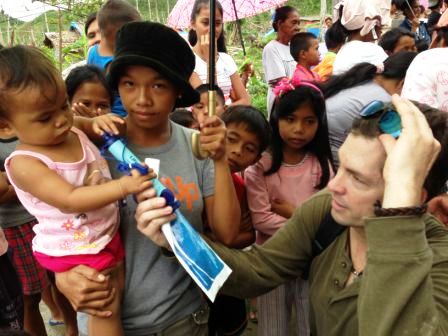
-
“Handing out Life Straws to survivors so they could drink water from the dirty river near a trash dump site.”
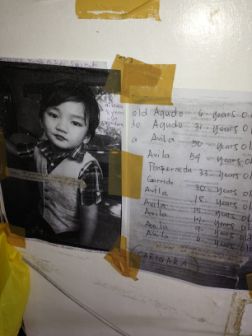
-
“Family members posted missing signs throughout the city and airport. Many survivors walked the beaches looking for their loved ones among the dead.”
“These people have gone through a tremendous ordeal and you want to be respectful. In our disaster recovery training we were taught to never say ‘I understand what you are going through’, because you really don’t,” says Scott.
All in all, Scott and his team were able to serve 870 individuals including providing new roofing for 73 families. Reflecting on his experience Scott says, “There are just overwhelming needs. We worked every day we were there from 8 a.m., getting back to our place about 8-9 pm. We all wish we could give more and do more but our time was up.”
Kip Scott is a senior partner with the Personal Injury Law Center in Irvine, California. The firm serves southern California from Santa Barbara down to San Diego. The firm has recovered millions of dollars for persons injured through no fault of their own. Scott has been recognized for his volunteer work with homeless children, Hurricane Katrina, and the Ground Zero Recovery Team.
Attorney James Kowalski: Pioneer Against Mortgage Robo-Signing
May 14th, 2012. By BrendaC
 Lawyers Giving Back Profile: Attorney James Kowalski, Jr.
Lawyers Giving Back Profile: Attorney James Kowalski, Jr.
Attorney James Kowalski, Jr. saw his first “robo-signing” case ten years ago, and it’s fair to say he’s been a pioneer in the fight to save thousands of Americans from illegal lawsuits launched by the mortgage and debt service industry. Much of that work Kowalski has done on his own time.
In 2002, Kowalski was handling a foreclosure case for client. The bank had rejected his client’s cashier’s check—and claimed he was in arrears.
Kowalski was surprised when he solicited a routine affidavit from a GMAC bank employee who was supposed to have firsthand knowledge of the client’s case. “She had not reviewed any of the documents,” he says.
As it turns out, Kowalski had found one of the first known cases of “robo-signing”.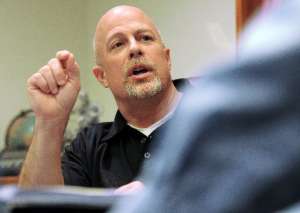
“What typically happens in a robo perjury case is that the witness reviews a computer screen that is usually populated by some other department—and the numbers on the screen match the documents they will sign,” says Kowalski. “And in many cases they actually don’t look at the screen, they just look to see their name is printed correctly.”
Two years ago, Kowalski was asked to address the House Judiciary Committee in Washington. As he waited for his turn, Kowalski sat dumb-founded as he listened to a panel of regulators testify.
“Every one of them said that they were not aware of the practices,” says Kowalski. “We were there to talk about things we had been living with for most of a decade—as just a normal part of any litigation in foreclosures in particular. So it was odd to hear these government regulators that are charged with supervising the servicing industry and compare that with those of us that actually litigate against the servicing industry—I just thought that was interesting.”
Kowalski was recently named as the winner of a Florida Bar Association Pro Bono service award. He was also named as the Consumer Protection Lawyer of the Year in 2011.
“I don’t track my hours,” says a very modest Kowalski. “I do a mix of cases involving foreclosures, credit card collection defense and some other legal aid someone may ask me to look at.”
“Especially with the foreclosures it is nice to make a change in those cases—because it is an enormous amount of stress that these people go through,” Kowalski adds.
Despite Kowalski’s efforts, and the efforts of others, robo-signing still continues. “It will take change by the regulators to end the practice,” Kowalski says.
James Kowalski is a former death penalty prosecutor now in private practice in Jacksonville, Florida. He handles serious personal injury cases, consumer litigation (including mortgage foreclosure defense cases, credit card and other debt collection defense cases), class actions, and business-to-business issues.
Attorney Ed Susolik Takes on 80-year-old’s Insurance Fight, Pro Bono
April 22nd, 2012. By BrendaC
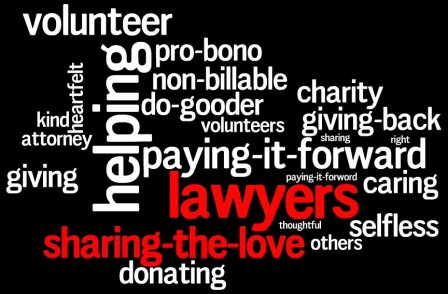 If you want a fight, attorney Ed Susolik is the kind of guy who will give you one. Not long ago, Susolik was so outraged when he read a newspaper story about an 80-year-old man who was getting the runaround from a big insurance company, that he offered his assistance, pro bono. “I just wanted to help. I just thought it was such a gross miscarriage of justice,” Susolik says.
If you want a fight, attorney Ed Susolik is the kind of guy who will give you one. Not long ago, Susolik was so outraged when he read a newspaper story about an 80-year-old man who was getting the runaround from a big insurance company, that he offered his assistance, pro bono. “I just wanted to help. I just thought it was such a gross miscarriage of justice,” Susolik says.
One of Southern California’s top insurance lawyers and a partner at the big name firm of Callahan & Blaine, Susolik has handled more than 1,000 bad-faith lawsuits. Although he’s known for insurance claims, Susolik’s real specialty is winning cases. 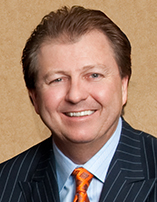
Ken Carrier had been battling with a security company for well over three months and he’d been getting absolutely no where. One phone call and a letter from a lawyer like Susolik and it was all over. The security company agreed to pick the expenses.
Last December, Carrier was out on an errand in Lake Forest, Orange County. He pulled his SUV into a parking lot near an AT&T store that had just been robbed seconds before. Suddenly, a pistol waving security guard, who claimed to be a police officer, was at the passenger door and ordering Carrier and his daughter out the vehicle. The security guard took off in Carrier’s vehicle, in hot pursuit of the AT&T robbery suspect. Shortly after, the security guard crashed the SUV into a pickup truck.
Through absolutely no fault of his own, Ken Carrier, retired and living on a fixed income, was suddenly out thousands of dollars. His insurance would pay the first $9,000—but not the rest which totaled another $15,000 for storing his vehicle; car rental until he could fix his SUV; doctor bills for headaches and dizzy spells; and the sheer stress of having a gun put to his face—and so on. The security company that commandeered his vehicle was refusing to take any responsibility.
“That, essentially, is what they told Mr. Carrier. They said we have a lawyer and we are big company and you are an 80-year-old man and we aren’t paying,” says Susolik.
“They took Mr. Carrier’s SUV and they crashed it,” he adds. “Why don’t you make the man whole? What is the problem?”
“Once you get into a certain age category, companies and people can take advantage of you,” says Susolik. “And I really felt that Mr. Carrier was being taken advantage of.”
“I said, “Look,” recalls Susolik “all the resources of our firm are going to come down on your head because this is financial elder abuse.”
This is not the first pro bono case Susolik has handled. “There are various reasons that people need pro bono assistance. Sometimes it is financial. Sometimes you lose your job or otherwise. Sometimes people just don’t have the background to handle legal issues,” he adds. “We are seeing more and more people who are elderly who are victims of financial abuse. Obviously on the real negative side you see the scams and everything. But with something like this—this should have been a very simple issue.”
Susolik just got a letter from Ken Carrier thanking him for his efforts. “It says, ‘I just got my first night’s sleep in months. Thanks’,” says Susolik. “And it has three exclamation marks!,” he adds, with a a smile in his voice.
Attorney Ed Susolik is a partner with Callahan & Blaine and is in charge of the firm’s insurance department. Attorney Susolik is an adjunct professor at USC Law School where he teaches Insurance Law. He is also a contributing editor to the leading insurance book in California, the “Rutter Guide treatise on Insurance Litigation”. Attorney Susolik was chair of the Orange County Bar Association Insurance Law Section for over 10 years. He was born in Czechoslovakia and earned his law degree at the University of Southern California. Susolik has recovered more than $1 billion for clients over the last two decades.
Attorney Mark Scurti lends a Pro Bono Hand to those facing Bankruptcy
January 17th, 2012. By BrendaC
Attorney Mark Scurti has donated countless hours of his time to help people through tight spots with creditors over the last decade. Since 2001, Scurti has handled more than 50 bankruptcy cases pro bono and has eight more on the docket for 2012. “I didn’t realize it had been that many,” says Scurt i. “You do what you need to do especially in times when people really need help.”
i. “You do what you need to do especially in times when people really need help.”
Not only has he personally handled pro bono cases, he’s also helped hundreds of other people avoid costly legal expenses by teaching them how to represent themselves in bankruptcy court.
Scurti, who is a bankruptcy lawyer with the firm of Hodes, Pessin & Katz, was recently chosen as the Maryland Volunteer Lawyers Service (MVLS) volunteer of the year. The award is in recognition of the volunteer attorney who has done the most to further assistance to pro bono clients through the MVLS. Modest to the core Scurti says, “I was very honored and humbled by that award but I am just one of many lawyers who do pro bono work. The Ma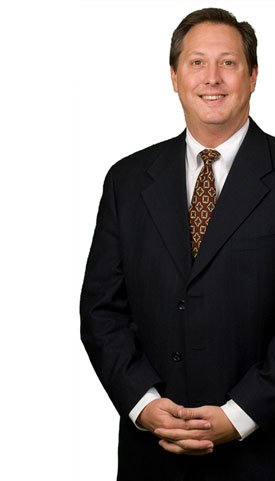 ryland Bar Association and MVLS are both very passionate about seeing that people are represented and making sure that the system works.”
ryland Bar Association and MVLS are both very passionate about seeing that people are represented and making sure that the system works.”
As many as 1,500 people a month in Maryland appear in bankruptcy or debtor court—many cannot afford a lawyer and there aren’t enough pro bono lawyers to go around. Up to 16 per cent of those people opt to represent themselves pro se—that is, advocate for themselves. “Finding volunteer lawyers to take all intake cases can be difficult,” says Scurti.
Scurti set up some “pro se” clinics where lawyers give filers a quick primer on what they need to know about going to bankruptcy court. “I harangued some fellow attorneys of mine to come in and provide 15 to 20 minute consultations,” says Scurti. “They can talk to an attorney after and get some guidance—is this something I should really do by myself—or do I need to get an attorney to do?”
And how do they do? “Well, they do pretty well,” says Scurti.”
“Obviously the forms are overwhelming to them but many times it is just a matter of unlocking some of the mysteries of what these forms are, where they go, and a lot of the folks can do it successfully,” he adds. “But there is a lot of support for them, too.”
Bankruptcy and debt problems are Scurti’s areas of expertise. For lawyers whose practices don’t typically handle those kinds of issues, but who would like to help the thousands of Americans struggling with debt problems, Scurti and the MVLS recently set up a workshop to get attorneys up to speed on bankruptcy court. “We actually got about 55 new attorneys who came in for the workshop on how to prepare a simple chapter 7 bankruptcy application,” he says. “We were able to place about 30 cases with pro bono attorneys and we got rid of a lot of cases that were back-logged in the system.”
Scurti and the MVLS even produced a video several years ago for pro se filers. It can be found on the US Bankruptcy court website.
Attorney Mark Scurti is a member of the Hodes, Pessin & Katz Corporate and Business Services Group. He primarily practices bankruptcy law. He also practices same-sex/LGBT law. He received his law degree from the University Of Baltimore School Of Law and holds a B.A. in Marketing/Business and an M.B.A. from Loyola College in Maryland.
Attorney Kristine Havlik: Wills for Heroes is Rewarding Pro Bono Work
December 20th, 2011. By BrendaC
 Milwaukee wills and estates lawyer, Kristine Havlik is sending out a clarion call to lawyers in all parts of the state of Wisconsin to share their valuable time to help prepare wills for the first responders who risk their lives each day in the service of others. Havlik, who is senior counsel with the firm of Foley & Lardner, helped establish the Wills for Heroes program in Wisconsin in 2009. Since then, the pro bono wills & estates clinics have prepared more than 1,000 estate planning documents for firefighters, police officers and other emergency personnel and their families.
Milwaukee wills and estates lawyer, Kristine Havlik is sending out a clarion call to lawyers in all parts of the state of Wisconsin to share their valuable time to help prepare wills for the first responders who risk their lives each day in the service of others. Havlik, who is senior counsel with the firm of Foley & Lardner, helped establish the Wills for Heroes program in Wisconsin in 2009. Since then, the pro bono wills & estates clinics have prepared more than 1,000 estate planning documents for firefighters, police officers and other emergency personnel and their families.
When Havlik heard about the Wills for Heroes Foundation from a colleague in a neighboring state two years ago, she saw an opportunity to help first responders in her home state. “When I realized there was an opportunity to bring the Wills for Heroes Program to Wisconsin I really jumped at the opportunity to find pro bono work in my practice area.”
The Wills for Heroes Foundation was originally the brainchild of Anthony Hayes, a partner with the Columbia, South Carolina firm of Nelson, Mullins, Riley & Scarborough, conceived of in the aftermath of the September 11th, 2001 attack on the Twin Towers. Since then the program has branched out to 27 states across the U.S. Its mission to is help “those who serve us” by providing free preparation of wills, living trusts, powers of attorney and other important estate documents to qualified persons serving in the military or as civic first responders.
Although the numbers may not be exact, it is estimated that 80 to 90 percent of these individuals do not have estate plans in place and the need to help them is a great according to Havlik.
Apart from the cost, there seem to be two barriers. The first is logistical, the second is psychological. “They work some unusual hours, it is not necessarily 9 to 5” explains Havlik. “It may be difficult for them to find the time to come in and meet with an estate planning attorney.”
“The second reason is that preparing estate documents may put into perspective the real dangers of their occupation and there may be some real fear of dealing with that,” she adds.
She specifically recalls a young man who had signed up to serve with the military after 9-11 and then went on to join the police department in Milwaukee. He brought his wife and baby in to sign estate documents. “He’d never had a will,” says Havlik.
Over the last two years Havlik has trained 500 lawyers to prepare wills and estates at free clinics in the Milwaukee, Madison and Green Bay areas of Wisconsin. “We are hoping to launch in northern and western Wisconsin and it is there that we’re struggling to find lawyers to take this on and go with the program,” says Havlik.
Havlik has recently been helping a colleague at the Foley & Lardner office in Tampa to establish a Wills for Heroes program in Florida.
Havlik’s leadership has been recognized in this area with both the Gordon Sinykin Award of Excellence (2010), an award that recognizes attorneys for their work on an individual law related education or public service project, and the coveted Milwaukee Bar Association Pro Bono Publico Award (2011). In addition, Ms. Havlik was named to the 2006, 2007 and 2008 lists of Wisconsin Super Lawyers–Rising Stars for her estates & trusts and tax & individual planning work.
Kristine L. Havlik, University of Virginia 1999, is senior counsel of Foley & Lardner LLP, Milwaukee. She is a founding volunteer and major advocate of the State Bar’s Wills for Heroes program.
Archive by Category
- Accidents (24)
- Airlines (9)
- Asbestos Mesothelioma (262)
- Automotive (25)
- Celebrity (14)
- Class Action (84)
- Complaints/Comments (15)
- Consumer Fraud (84)
- Contest (2)
- Court of Public Opinion (5)
- Crazy Sh*t Lawyers See (61)
- Criminal Law (4)
- Defective Products (111)
- DePuy ASR Hip Recall (2)
- Discrimination (22)
- Drugs/Medical (248)
- Elder Care Abuse (4)
- Emerging Issues (462)
- Employment (54)
- Environment (52)
- Financial (28)
- Food Illness (15)
- Human/Civil Rights (4)
- Insecurities (5)
- Insurance (16)
- Intellectual Property (16)
- Internet/E-commerce (19)
- lawsuits (161)
- Lawyers (20)
- Lawyers Giving Back (43)
- Lex Levity (10)
- Personal Injury (106)
- Pleading Ignorance (53)
- Real Estate (2)
- Recall (6)
- Scam (3)
- Securities (13)
- Settlement (81)
- Tort Reform (2)
- Totally Tortelicious (81)
- Veterans (11)
- Whistleblower (9)
